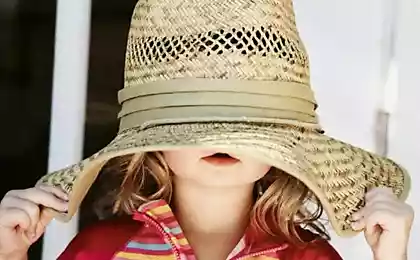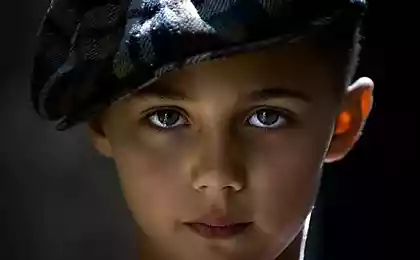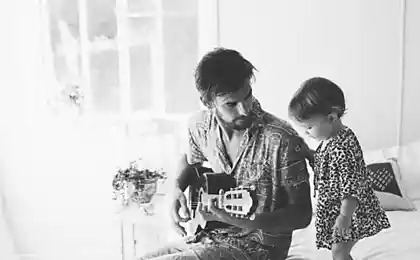783
EASY-child: The common goal of education
Education "new": what to do with the kids?
"Six years ago, my daughter was expecting the birth of their first child, my grandson.
She took great care to prepare for childbirth — attended school mom, to know how a child is and what he is at different stages of pregnancy. She did special exercises and listened to the night calm and beautiful music. She ate properly and learned to breathe correctly and to distribute the load in childbirth. She chose a very good hospital, which was called "the Hospital of respect for the child." Knowing how important the first minutes and hours of a child's life for his attitude, she and her husband chose a paid room in which the child was with mom and I could visit relatives.
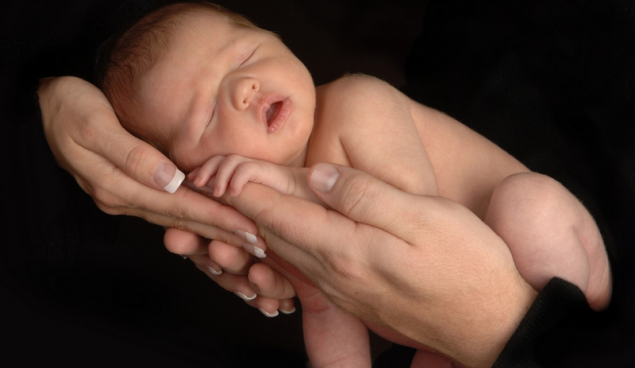
And when I after a few hours after birth, came to her, I saw them together — little Nikita and happy daughter. Everything went well and easily, as she prepared to leave, and waited. And daughter, laughing, told me how, faced with the first difficulty:
— You know, mom, I gave birth to him, took him away, to wash, to examine me in the house brought. I'm still waiting that it will bring, but its still no. And I tell the nurse where is my child? I need him with me was not to remain alone...
And she laughs:
I'll get your child... in Time with him to natureshots...
Really in a few minutes brings, or rather brings it in such a transparent natalochka and leaves me with him.
She leaves and I look at him: he is asleep — so small, so cute.
And here I with horror think: "what am I supposed to do with it?"
What you need to do before the birth, to give birth to his healthy to birth went well, the Breasts were ready to feed — all I did. And here he was born. And I'm sitting alone with him and don't know — and then what? What now do I do with it?
Me, mom, I go out into the corridor and shouted after the nurse,
— Come back, please.
It comes so perplexed — says:
— Something happened?
— No — say — nothing happened, only you tell me: now what do I do with it?
She didn't understand, asked:
— Like what? Cry — to the breast apply. Or — diaper see if you need to change. Or rock or Pat her tummy...
Me, mom, of course, it became easier, because at least something was clear. But in the horror! To give birth, I gave birth to him, but then what to do with it, how to raise him — did not know...
We then laughed over this fear. But I think that is what most often parents feel being alone with your child.
Especially in the early days, when he's so little. When there is still no experience. When, even taking him in his arms, afraid — as if he do no harm.
But there comes a time, and getting better, it becomes clear, is part of some system, as the number of bubbles and jars standing on the dresser. Here's a bottle of water. Here is prisypok. Here tamponchiki cotton. And here is a pile of diapers. Here is a clean diaper. And there is some skill in caring for a baby.
And we, walking with strollers, dealing with the same parents, sharing their experiences or concerns by sharing the first experience of parenthood.
This period, if I may say so, the "initial" communication with the child, is a very interesting parents. There are many new attributes — bottle nipples, rattles, prisypki, napkins... there is a lot of new occupations — bathing, and diapering, feeding, rocking. It is so interesting and exciting at first — care of the child. It is already known to women of their children's experience of playing with dolls. Only now the doll became alive.
And the first two years of a child's life are in this interesting and exciting interaction. The child grows, he is already sitting. Here he crawls. He begins to walk, he speaks the first words. He himself, his actions cause so much emotion! And again, the young parents discuss it with other parents, come out for a walk with their kids.
And, as a rule, in the first few years of life with a child parents overact this role is to be a parent. And even a little tired of this role. It becomes familiar. And the role of parenting becomes clear. And there is a feeling, even the assurance that parents now know what to do with the child. And close communication with other parents is terminated: why, when and so all is clear?
And in the background this illusory confidence, and there are more and more questions.
Because if everything ends up being — put to the breast, diaper change, RUB the bull's eye feed from the spoon, put with it the pyramid...
But the child grows and explores the world around him begins to pick up some items and pulls the fingers into a wall socket. Or up from the ground some stuff and drags it in her mouth to taste. And we must somehow raise him, something to do with it.
The child grows, and in the process of growth is constantly there are situations that require our response, sometimes instant. There are problems that require resolution. And replace one problem — does not eat or does not clean a toy — comes another, more complicated: not wanting to go to the garden, don't listen, vrednichaet. And again the question arises — what to do with it?
And with the growth of the child issues becomes greater. Writes like chicken scratch. Not plodding. It is not learning. What to do with it?
And then fights with kids, and then being cheeky to the teacher, and then befriends a bad boy... And then want to disco, but he still has time. And then — require to buy an expensive thing. And then — home is not dozoveshsya. And then the school scored... And what to do with it? What to do with all this?
This question permeates all our relationships with children. And it's a perfectly normal question, because we are not really taught what to do with children when they are born. What to do with them, their behavior, their unwillingness to do something, or a desire to do what needs to be done.
And not only do we have to react to the actions and behavior of children, we have something for them to do. We must teach them to use a spoon, fold clothes, brush your teeth, be polite and tidy. We need to educate them. But how? In what ways, methods?
And again I draw your attention that when the child grows up, starts to do things, to interact with other children and to your experience of life, when and begins a serious stage of education we, the parents, already reassured by the fact that we know what it's like to be a parent and face many situations and problems that require really our conscious and competent response. And we are left alone with a child in the midst of all the problems associated with its growth and changing behavior. And start to purchase your new experience.
And this first experience of us "caregivers", usually contains a huge number of errors. Because we really have not been taught how to raise a child.We do so, as it turns out. We do it the way we suggest our social experiences, social rules and norms.
Begin work invested in us (and often don't realized!) beliefs and perceptions about what it means to raise a child, what it means to be a parent.
These beliefs and perceptions and create a range of actions we take in response to all of our "What to do with them?"
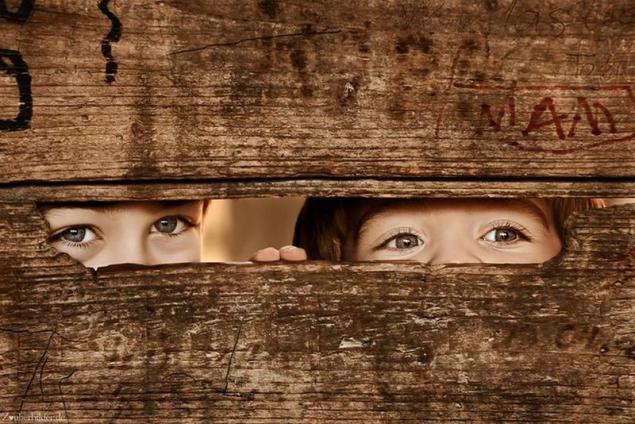
Life is what you believe
Our picture of the world, ideas about the world and its possibilities completely define our place in this world, relations with the world, using or not using its capabilities.
This is a presentation about myself, as part of the relationship. Who am I? What am I worth? What do I have? What I can and can't do? This is a picture of another person with whom I enter into a relationship. Who is the other person? What place in the relationship he taking? What kind of role? What can he do? What should he do?
My system of beliefs about yourself as a parent, are representations that such a thing is to be a parent?
My system of beliefs about the child includes the submission — who's the baby? This is separate from my being — a part of me, my property, which I have to manage? What is it — small or large? Independent or helpless? Weak or strong? Why would I kid?
All these presentations and will determine all of my "What to do with it?", will lead to concrete results of education.
What is education?
Education for most parents is finding flaws in the child and to eradicate them. That's perceived by the majority of parents the child — as something imperfect, "unfinished" or already spoiled.
Therefore, education is often understood as a "reworking" of the child, "eradication" that is bad, which it has. (I wonder just where's it from, it appears, because the newborn child there is nothing wrong?!)
How many of the limited, evil, stupid parents I have met in my time psychologist's practice! And how wise, smart, good in their understanding, acceptance and forgiveness of the children I know!
Oh, if all this was true — adult, wise, intelligent and kind person affects the little man, and the result is another adult, wise, intelligent, and kind person.One perfect person influences the other, less perfect — and the result is another perfect person.
But that only raises the question: are perfect are we, adults? And so we are always smart, not to mention wisdom! And what is the result of our "impact", if we appear from somewhere (and they only become that?!) harmful, nasty, cranky, difficult, and sometimes disgusting children?
But this attitude towards the education as to the impact of a large, knowledgeable, important and significant personality on the little, ignorant, stupid and helpless creature is typical of most parents. So the roles:
There I was — an adult, intelligent(?), who knows (?), the main(!) — which is the effect.
He is small and stupid, and he must submit to my influence, to listen to me, chief.
And this distribution of roles will require specific methods of upbringing, in which my leadership is perhaps the meaning of which is to subject the child, to secure his obedience. I just needed it to be a calling.
With this upbringing I just can't (I don't have to do it!) to use the methods in which the child is equal to me in personality. The person that I respect, and himself in the process of our cooperation, we grow together with her. Why do I need this when I'm already so smart and knowledgeable?
How to raise children, everyone knows, except those who have them. ©Patrick O'rourke
Who do you want to?
These questions always make parents a stupor. Have never in my life, having conducted dozens of trainings for parents, I have not heard any good answer to these questions.
Because of this often do not think about. We have babies, not having to realize why we do it, what they want to grow. The child just appears to start (as a moth in the closet — such associations gives me this word!). And then — something to do with it?!
It's amazing, but when I buy furniture, I have a clear picture — what furniture I want in my apartment. When I buy a car, I have a clear picture — what brand is the car you want to see in your garage. But when people ask me: "What baby do you want to see?" in response — silence... Because of this most often do not think.
But if you don't think about goals, you'll never get what you want. Because you don't know what you want! And we bring up, not even thinking — they should get as a result.
Actually, this is really a very important global significance for the questions — I was given the life of another separate from me — what am I gonna do with her? What I'll do with him? What it will do? How will this affect his life?
We need to answer these questions, to go to conscious meaningful impact on our children.
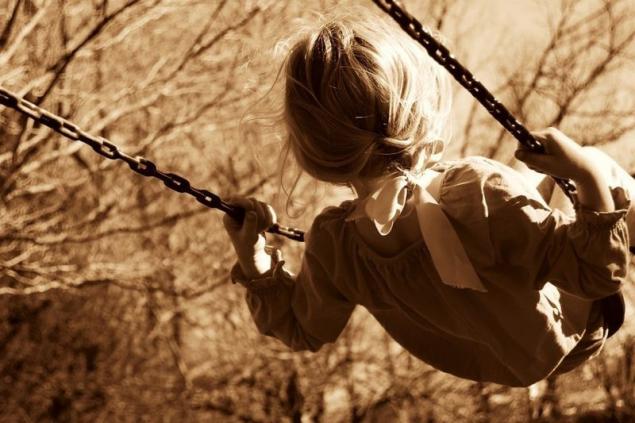
I don't like child...
Every time you start a training for parents, I give parents a simple task. I asked to divide a sheet of paper into two halves and on one of them to write, list everything you love about the child, on the other — what's not to like, that I would like to fix what they, as parents dissatisfied.
And you know what always happened? The list of things not to like about the kid and was always bigger, bulkier, and more than a list of what like about him.
What we don't like in our children?
We do not like that they are not listening to us that they are noisy, litter, don't want to eat dirty clothes, beg for money, spend it on nonsense, are friends with kids who get bad grades, you don't want to learn, do not want to go to kindergarten and school, they are not waking in the morning and down at night, they run, stomp, minding my own business, fighting or not fighting, when to fight back, mumbling, yelling good mate in the most unlikely place, claim, accuse us that we are something they are not bought all the time you want something, you want stupidity, do not allow us to relax, not allowed to sleep, afraid of something, whine, whine, run after us as tied to the rope, strive to leave home, they will not drive home from the street or Vice versa, not kicked out, they create so many problems, they constantly get sick, need attention, leave us alone etc. etc.
The first twelve months, we teach our children to walk and talk and the next twelve years is to sit down and shut up. ©Phyllis Diller
I was always struck by this list of our claims to children. Listening to all these "don't like", I always thought: "I Wonder in children anything good to eat?!"
Let's once more under a microscope, consider these our "do not like". What we don't like? Why not like it? Who does not like?
I don't like when my child is noisy, stomping feet or shouts, loudly singing songs or listening to loud music. Why I don't like it? Because I want silence. And he wants to stomp, run, sing or listen to loud music. And I don't like that he is not doing what I want.
I don't like that he doesn't eat the cereal that I had planned for him. Why I don't like it? Because I want to eat this mess. And he does not want. He doesn't want to do what I want.
I don't like that he doesn't want to clean up toys, or to clean the bathroom or do General cleaning. Why I don't like it? Because I want to do it. And he does not want. He wants to play, or read, or listen to music. He doesn't want to do what I want.
I don't like when he beg for money for ice cream or a toy, or to disk. Why I don't like it? Because I don't want to spend the money. I don't want him to buy what he wants.
: Whether we like it or not, our children do not like us for two reasons:
We don't like when they do what we don't want to do.
We don't like it when they don't do what we want them to do.
I like the baby...
We love the sincerity and openness of a child. We like his natural ability childishly pure and naive to say something, to give some of his secrets. We are touched by listening to our children, their amusing statements, naive reasoning.
Sentimental... But from time to time. While their reasoning and stories do not cross the boundaries that we set.
And frames we set ourselves.
We love the sincerity and openness of the children, expressed only to us. We don't like when they are as open with others.
We love the sincerity and openness of our children when they say nice things to us. And when they sincerely and naturally Express their feelings, talking about you cooked the porridge: "Oh, what tasteless porridge!.." Or: "You got me fooled again... You're a bad mother..." Such sincerity and openness we do not like. For this "sincerity" I want to give my lips!
We love when our children are having fun, laughing, filled with laughter, rejoicing. They are so cute when you openly Express your emotions. We like this natural expression of emotions. But again, within certain limits!
We like them good emotions, pleasant emotions to us. And when he yells in the store, expressing their indignation at the fact that it is not buy? And when he whines or capricious, expressing his displeasure with something? Such emotions we don't like. Such a child is harmful and nasty!
We like it when they naturally Express their feelings. But only those feelings that we like!
We like the kindness of our children, the ability to share with others. But again — to a certain limit. Who set this limit? We adults do.
And they like us when they understand us. And when you do not understand? When you do not want to accept our explanation? When you do not want to live by our rules?
These children we don't like. Such children we reject, criticize, criticize.
We like it when they stand up for themselves, fight back in a fight, defending themselves in a dispute, to defend its stance in conversation with their peers. And when they argue with us? When defending their position and not support our? When they protect themselves from our hands? Such children we enrage and irritate! These children we don't like!
We love their curiosity, their questions, their interest in the world. But only to those limits which we ourselves set for them. We don't like it when they get interested in what, in our opinion they do not need to be interested in anyone poking into their Affairs, asking, for example, why my dad got into a fight.
We like it when they agree with what we choose for them. And we stuffed our children (this word sometimes completely reflects our attitude to them!) the study of the English language, sports or music school, not interested in whether or not they want to do it. We believe that the better they know what they need. And we don't like it when children do not agree with our choices, protesting, rebelling, when they want to choose a class.
We love our children, when they like us. We just adore these children, who say: "My mother is the most beautiful! My dad is the strongest!"
We like when they evaluate us well. We love these children.
And when they appreciate us bad? And when they're pissed at us? When they Express to us their claims? When accusing us? "That's not fair... You promised... You're a liar..." This attitude to us we are outraged to the core. These children we don't like.
We like children, we praise. We like good behavior for our children when we are jealous of friends, saying, "you have a beautiful child!" We like it when they are praised when they perform somewhere, as our egos. When acting, good study and we are praised at the parent meeting. We like it when they look good, clean, neat, beautiful. We like the elegant and decorous children, like puppets.
And when they dishonor us? When misbehave or get bad grades? When you come home grimy, pritaskivaya in building sand or dirt from the street? We like such children? No you don't.
We don't like children. We don't like loose children. Not like unsuccessful children. We don't like children with their views, their wishes.
We don't like awkward children. We don't like naughty children. But what is inconvenient and disobedient child?
Is a child who does what he wants to do. Which naturally expresses their thoughts and feelings. Who actively explores the world, so he comes home dirty, in soiled clothing. Who doesn't live by our rules and restrictions.
Is a child who does not always listen to our advice and do as he says.
Which is not doing what we told him, and does what he wants to do.
Who disagrees with us and decides.
How uncomfortable these children for parents! And how convenient, manageable and Executive!
Therefore we like convenient for us children. We like obedient children.
But what is easy and obedient child?
It's a child, unquestioningly follow our requirements, understanding our limitations, agreeing with our choices. Doing what we want to do. Not doing what we don't want to do.
And it really is the most common goal of education — to educate the docile, friendly child.
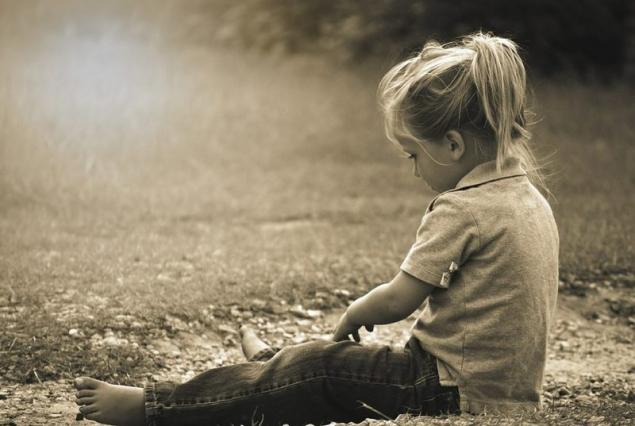
The child should...
— What skills should your child? How to be your child after your pedagogical influence on him? — I ask parents to help them understand — what they want to educate your child?
Starts to get interesting, and always the same thread of replies:
He must be neat
Behave
Must respect others
Must be polite
Must be well mannered
A list of these "needs" is long, diverse and always the same.
This list is always about behavior, child behavior, and never about himself.
This list is always about how he should behave, not about how it should be.
Whether we like it or not, our unconscious views and beliefs about the purpose of education is often aimed at achieving good external behavior of children.
But the first and most important thing we must do for our children is not to teach them to be neat or polite — that will teach them life itself, society.
We need to teach them to be strong and self-confident. We must teach them to stand up for themselves, to take their place in life, to have his position. To be so — so in his life all worked out. But this important goal is to teach children to be strong, confident, respectful of themselves behind himself, almost not raised by most parents.
And these small goals, becoming the main goals of the education for many parents, break, destroy, make it impossible to achieve the main, the highest goal of education — the formation of PERSONALITY". published
Author: Marusya Svetlova
P. S. And remember, just changing your mind — together we change the world! ©
Source: www.svet-love.ru/vospitanie-po-novomu.html
"Six years ago, my daughter was expecting the birth of their first child, my grandson.
She took great care to prepare for childbirth — attended school mom, to know how a child is and what he is at different stages of pregnancy. She did special exercises and listened to the night calm and beautiful music. She ate properly and learned to breathe correctly and to distribute the load in childbirth. She chose a very good hospital, which was called "the Hospital of respect for the child." Knowing how important the first minutes and hours of a child's life for his attitude, she and her husband chose a paid room in which the child was with mom and I could visit relatives.

And when I after a few hours after birth, came to her, I saw them together — little Nikita and happy daughter. Everything went well and easily, as she prepared to leave, and waited. And daughter, laughing, told me how, faced with the first difficulty:
— You know, mom, I gave birth to him, took him away, to wash, to examine me in the house brought. I'm still waiting that it will bring, but its still no. And I tell the nurse where is my child? I need him with me was not to remain alone...
And she laughs:
I'll get your child... in Time with him to natureshots...
Really in a few minutes brings, or rather brings it in such a transparent natalochka and leaves me with him.
She leaves and I look at him: he is asleep — so small, so cute.
And here I with horror think: "what am I supposed to do with it?"
What you need to do before the birth, to give birth to his healthy to birth went well, the Breasts were ready to feed — all I did. And here he was born. And I'm sitting alone with him and don't know — and then what? What now do I do with it?
Me, mom, I go out into the corridor and shouted after the nurse,
— Come back, please.
It comes so perplexed — says:
— Something happened?
— No — say — nothing happened, only you tell me: now what do I do with it?
She didn't understand, asked:
— Like what? Cry — to the breast apply. Or — diaper see if you need to change. Or rock or Pat her tummy...
Me, mom, of course, it became easier, because at least something was clear. But in the horror! To give birth, I gave birth to him, but then what to do with it, how to raise him — did not know...
We then laughed over this fear. But I think that is what most often parents feel being alone with your child.
Especially in the early days, when he's so little. When there is still no experience. When, even taking him in his arms, afraid — as if he do no harm.
But there comes a time, and getting better, it becomes clear, is part of some system, as the number of bubbles and jars standing on the dresser. Here's a bottle of water. Here is prisypok. Here tamponchiki cotton. And here is a pile of diapers. Here is a clean diaper. And there is some skill in caring for a baby.
And we, walking with strollers, dealing with the same parents, sharing their experiences or concerns by sharing the first experience of parenthood.
This period, if I may say so, the "initial" communication with the child, is a very interesting parents. There are many new attributes — bottle nipples, rattles, prisypki, napkins... there is a lot of new occupations — bathing, and diapering, feeding, rocking. It is so interesting and exciting at first — care of the child. It is already known to women of their children's experience of playing with dolls. Only now the doll became alive.
And the first two years of a child's life are in this interesting and exciting interaction. The child grows, he is already sitting. Here he crawls. He begins to walk, he speaks the first words. He himself, his actions cause so much emotion! And again, the young parents discuss it with other parents, come out for a walk with their kids.
And, as a rule, in the first few years of life with a child parents overact this role is to be a parent. And even a little tired of this role. It becomes familiar. And the role of parenting becomes clear. And there is a feeling, even the assurance that parents now know what to do with the child. And close communication with other parents is terminated: why, when and so all is clear?
And in the background this illusory confidence, and there are more and more questions.
Because if everything ends up being — put to the breast, diaper change, RUB the bull's eye feed from the spoon, put with it the pyramid...
But the child grows and explores the world around him begins to pick up some items and pulls the fingers into a wall socket. Or up from the ground some stuff and drags it in her mouth to taste. And we must somehow raise him, something to do with it.
The child grows, and in the process of growth is constantly there are situations that require our response, sometimes instant. There are problems that require resolution. And replace one problem — does not eat or does not clean a toy — comes another, more complicated: not wanting to go to the garden, don't listen, vrednichaet. And again the question arises — what to do with it?
And with the growth of the child issues becomes greater. Writes like chicken scratch. Not plodding. It is not learning. What to do with it?
And then fights with kids, and then being cheeky to the teacher, and then befriends a bad boy... And then want to disco, but he still has time. And then — require to buy an expensive thing. And then — home is not dozoveshsya. And then the school scored... And what to do with it? What to do with all this?
This question permeates all our relationships with children. And it's a perfectly normal question, because we are not really taught what to do with children when they are born. What to do with them, their behavior, their unwillingness to do something, or a desire to do what needs to be done.
And not only do we have to react to the actions and behavior of children, we have something for them to do. We must teach them to use a spoon, fold clothes, brush your teeth, be polite and tidy. We need to educate them. But how? In what ways, methods?
And again I draw your attention that when the child grows up, starts to do things, to interact with other children and to your experience of life, when and begins a serious stage of education we, the parents, already reassured by the fact that we know what it's like to be a parent and face many situations and problems that require really our conscious and competent response. And we are left alone with a child in the midst of all the problems associated with its growth and changing behavior. And start to purchase your new experience.
And this first experience of us "caregivers", usually contains a huge number of errors. Because we really have not been taught how to raise a child.We do so, as it turns out. We do it the way we suggest our social experiences, social rules and norms.
Begin work invested in us (and often don't realized!) beliefs and perceptions about what it means to raise a child, what it means to be a parent.
These beliefs and perceptions and create a range of actions we take in response to all of our "What to do with them?"

Life is what you believe
Our picture of the world, ideas about the world and its possibilities completely define our place in this world, relations with the world, using or not using its capabilities.
This is a presentation about myself, as part of the relationship. Who am I? What am I worth? What do I have? What I can and can't do? This is a picture of another person with whom I enter into a relationship. Who is the other person? What place in the relationship he taking? What kind of role? What can he do? What should he do?
My system of beliefs about yourself as a parent, are representations that such a thing is to be a parent?
My system of beliefs about the child includes the submission — who's the baby? This is separate from my being — a part of me, my property, which I have to manage? What is it — small or large? Independent or helpless? Weak or strong? Why would I kid?
All these presentations and will determine all of my "What to do with it?", will lead to concrete results of education.
What is education?
Education for most parents is finding flaws in the child and to eradicate them. That's perceived by the majority of parents the child — as something imperfect, "unfinished" or already spoiled.
Therefore, education is often understood as a "reworking" of the child, "eradication" that is bad, which it has. (I wonder just where's it from, it appears, because the newborn child there is nothing wrong?!)
How many of the limited, evil, stupid parents I have met in my time psychologist's practice! And how wise, smart, good in their understanding, acceptance and forgiveness of the children I know!
Oh, if all this was true — adult, wise, intelligent and kind person affects the little man, and the result is another adult, wise, intelligent, and kind person.One perfect person influences the other, less perfect — and the result is another perfect person.
But that only raises the question: are perfect are we, adults? And so we are always smart, not to mention wisdom! And what is the result of our "impact", if we appear from somewhere (and they only become that?!) harmful, nasty, cranky, difficult, and sometimes disgusting children?
But this attitude towards the education as to the impact of a large, knowledgeable, important and significant personality on the little, ignorant, stupid and helpless creature is typical of most parents. So the roles:
There I was — an adult, intelligent(?), who knows (?), the main(!) — which is the effect.
He is small and stupid, and he must submit to my influence, to listen to me, chief.
And this distribution of roles will require specific methods of upbringing, in which my leadership is perhaps the meaning of which is to subject the child, to secure his obedience. I just needed it to be a calling.
With this upbringing I just can't (I don't have to do it!) to use the methods in which the child is equal to me in personality. The person that I respect, and himself in the process of our cooperation, we grow together with her. Why do I need this when I'm already so smart and knowledgeable?
How to raise children, everyone knows, except those who have them. ©Patrick O'rourke
Who do you want to?
These questions always make parents a stupor. Have never in my life, having conducted dozens of trainings for parents, I have not heard any good answer to these questions.
Because of this often do not think about. We have babies, not having to realize why we do it, what they want to grow. The child just appears to start (as a moth in the closet — such associations gives me this word!). And then — something to do with it?!
It's amazing, but when I buy furniture, I have a clear picture — what furniture I want in my apartment. When I buy a car, I have a clear picture — what brand is the car you want to see in your garage. But when people ask me: "What baby do you want to see?" in response — silence... Because of this most often do not think.
But if you don't think about goals, you'll never get what you want. Because you don't know what you want! And we bring up, not even thinking — they should get as a result.
Actually, this is really a very important global significance for the questions — I was given the life of another separate from me — what am I gonna do with her? What I'll do with him? What it will do? How will this affect his life?
We need to answer these questions, to go to conscious meaningful impact on our children.

I don't like child...
Every time you start a training for parents, I give parents a simple task. I asked to divide a sheet of paper into two halves and on one of them to write, list everything you love about the child, on the other — what's not to like, that I would like to fix what they, as parents dissatisfied.
And you know what always happened? The list of things not to like about the kid and was always bigger, bulkier, and more than a list of what like about him.
What we don't like in our children?
We do not like that they are not listening to us that they are noisy, litter, don't want to eat dirty clothes, beg for money, spend it on nonsense, are friends with kids who get bad grades, you don't want to learn, do not want to go to kindergarten and school, they are not waking in the morning and down at night, they run, stomp, minding my own business, fighting or not fighting, when to fight back, mumbling, yelling good mate in the most unlikely place, claim, accuse us that we are something they are not bought all the time you want something, you want stupidity, do not allow us to relax, not allowed to sleep, afraid of something, whine, whine, run after us as tied to the rope, strive to leave home, they will not drive home from the street or Vice versa, not kicked out, they create so many problems, they constantly get sick, need attention, leave us alone etc. etc.
The first twelve months, we teach our children to walk and talk and the next twelve years is to sit down and shut up. ©Phyllis Diller
I was always struck by this list of our claims to children. Listening to all these "don't like", I always thought: "I Wonder in children anything good to eat?!"
Let's once more under a microscope, consider these our "do not like". What we don't like? Why not like it? Who does not like?
I don't like when my child is noisy, stomping feet or shouts, loudly singing songs or listening to loud music. Why I don't like it? Because I want silence. And he wants to stomp, run, sing or listen to loud music. And I don't like that he is not doing what I want.
I don't like that he doesn't eat the cereal that I had planned for him. Why I don't like it? Because I want to eat this mess. And he does not want. He doesn't want to do what I want.
I don't like that he doesn't want to clean up toys, or to clean the bathroom or do General cleaning. Why I don't like it? Because I want to do it. And he does not want. He wants to play, or read, or listen to music. He doesn't want to do what I want.
I don't like when he beg for money for ice cream or a toy, or to disk. Why I don't like it? Because I don't want to spend the money. I don't want him to buy what he wants.
: Whether we like it or not, our children do not like us for two reasons:
We don't like when they do what we don't want to do.
We don't like it when they don't do what we want them to do.
I like the baby...
We love the sincerity and openness of a child. We like his natural ability childishly pure and naive to say something, to give some of his secrets. We are touched by listening to our children, their amusing statements, naive reasoning.
Sentimental... But from time to time. While their reasoning and stories do not cross the boundaries that we set.
And frames we set ourselves.
We love the sincerity and openness of the children, expressed only to us. We don't like when they are as open with others.
We love the sincerity and openness of our children when they say nice things to us. And when they sincerely and naturally Express their feelings, talking about you cooked the porridge: "Oh, what tasteless porridge!.." Or: "You got me fooled again... You're a bad mother..." Such sincerity and openness we do not like. For this "sincerity" I want to give my lips!
We love when our children are having fun, laughing, filled with laughter, rejoicing. They are so cute when you openly Express your emotions. We like this natural expression of emotions. But again, within certain limits!
We like them good emotions, pleasant emotions to us. And when he yells in the store, expressing their indignation at the fact that it is not buy? And when he whines or capricious, expressing his displeasure with something? Such emotions we don't like. Such a child is harmful and nasty!
We like it when they naturally Express their feelings. But only those feelings that we like!
We like the kindness of our children, the ability to share with others. But again — to a certain limit. Who set this limit? We adults do.
And they like us when they understand us. And when you do not understand? When you do not want to accept our explanation? When you do not want to live by our rules?
These children we don't like. Such children we reject, criticize, criticize.
We like it when they stand up for themselves, fight back in a fight, defending themselves in a dispute, to defend its stance in conversation with their peers. And when they argue with us? When defending their position and not support our? When they protect themselves from our hands? Such children we enrage and irritate! These children we don't like!
We love their curiosity, their questions, their interest in the world. But only to those limits which we ourselves set for them. We don't like it when they get interested in what, in our opinion they do not need to be interested in anyone poking into their Affairs, asking, for example, why my dad got into a fight.
We like it when they agree with what we choose for them. And we stuffed our children (this word sometimes completely reflects our attitude to them!) the study of the English language, sports or music school, not interested in whether or not they want to do it. We believe that the better they know what they need. And we don't like it when children do not agree with our choices, protesting, rebelling, when they want to choose a class.
We love our children, when they like us. We just adore these children, who say: "My mother is the most beautiful! My dad is the strongest!"
We like when they evaluate us well. We love these children.
And when they appreciate us bad? And when they're pissed at us? When they Express to us their claims? When accusing us? "That's not fair... You promised... You're a liar..." This attitude to us we are outraged to the core. These children we don't like.
We like children, we praise. We like good behavior for our children when we are jealous of friends, saying, "you have a beautiful child!" We like it when they are praised when they perform somewhere, as our egos. When acting, good study and we are praised at the parent meeting. We like it when they look good, clean, neat, beautiful. We like the elegant and decorous children, like puppets.
And when they dishonor us? When misbehave or get bad grades? When you come home grimy, pritaskivaya in building sand or dirt from the street? We like such children? No you don't.
We don't like children. We don't like loose children. Not like unsuccessful children. We don't like children with their views, their wishes.
We don't like awkward children. We don't like naughty children. But what is inconvenient and disobedient child?
Is a child who does what he wants to do. Which naturally expresses their thoughts and feelings. Who actively explores the world, so he comes home dirty, in soiled clothing. Who doesn't live by our rules and restrictions.
Is a child who does not always listen to our advice and do as he says.
Which is not doing what we told him, and does what he wants to do.
Who disagrees with us and decides.
How uncomfortable these children for parents! And how convenient, manageable and Executive!
Therefore we like convenient for us children. We like obedient children.
But what is easy and obedient child?
It's a child, unquestioningly follow our requirements, understanding our limitations, agreeing with our choices. Doing what we want to do. Not doing what we don't want to do.
And it really is the most common goal of education — to educate the docile, friendly child.

The child should...
— What skills should your child? How to be your child after your pedagogical influence on him? — I ask parents to help them understand — what they want to educate your child?
Starts to get interesting, and always the same thread of replies:
He must be neat
Behave
Must respect others
Must be polite
Must be well mannered
A list of these "needs" is long, diverse and always the same.
This list is always about behavior, child behavior, and never about himself.
This list is always about how he should behave, not about how it should be.
Whether we like it or not, our unconscious views and beliefs about the purpose of education is often aimed at achieving good external behavior of children.
But the first and most important thing we must do for our children is not to teach them to be neat or polite — that will teach them life itself, society.
We need to teach them to be strong and self-confident. We must teach them to stand up for themselves, to take their place in life, to have his position. To be so — so in his life all worked out. But this important goal is to teach children to be strong, confident, respectful of themselves behind himself, almost not raised by most parents.
And these small goals, becoming the main goals of the education for many parents, break, destroy, make it impossible to achieve the main, the highest goal of education — the formation of PERSONALITY". published
Author: Marusya Svetlova
P. S. And remember, just changing your mind — together we change the world! ©
Source: www.svet-love.ru/vospitanie-po-novomu.html
5 myths about children and parents, which is to debunk
John wooden: Difference between winning and success



